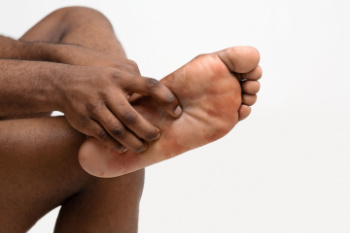Wesley Chapel
(813) 973-3535Call or Text
Blog

Plantar fasciitis is a common foot condition characterized by inflammation or degeneration of the plantar fascia, a thick band of tissue that runs across the bottom of the foot, connecting the heel bone to the toes. It typically causes stabbing pain near the heel, especially with the first steps in the morning or after long periods of rest. This condition often occurs due to repetitive strain or overuse, leading to micro-tears in the plantar fascia. Estimates suggest that approximately ten percent of the population may experience plantar fasciitis at some point in their lives. Treatment under a podiatrist's care may involve a combination of strategies, including rest, stretching exercises, custom-made orthotic devices, wearing supportive footwear, and in some cases, corticosteroid injections. The approach may vary depending on the severity of symptoms and whether the condition is primarily inflammatory or degenerative. If you have heel pain, it is suggested that you schedule an appointment with a podiatrist for a proper diagnosis and treatment plan that is right for you.
Plantar fasciitis is a common foot condition that is often caused by a strain injury. If you are experiencing heel pain or symptoms of plantar fasciitis, contact one of our podiatrists from New Tampa Foot & Ankle. Our doctors can provide the care you need to keep you pain-free and on your feet.
What Is Plantar Fasciitis?
Plantar fasciitis is one of the most common causes of heel pain. The plantar fascia is a ligament that connects your heel to the front of your foot. When this ligament becomes inflamed, plantar fasciitis is the result. If you have plantar fasciitis you will have a stabbing pain that usually occurs with your first steps in the morning. As the day progresses and you walk around more, this pain will start to disappear, but it will return after long periods of standing or sitting.
What Causes Plantar Fasciitis?
- Excessive running
- Having high arches in your feet
- Other foot issues such as flat feet
- Pregnancy (due to the sudden weight gain)
- Being on your feet very often
There are some risk factors that may make you more likely to develop plantar fasciitis compared to others. The condition most commonly affects adults between the ages of 40 and 60. It also tends to affect people who are obese because the extra pounds result in extra stress being placed on the plantar fascia.
Prevention
- Take good care of your feet – Wear shoes that have good arch support and heel cushioning.
- Maintain a healthy weight
- If you are a runner, alternate running with other sports that won’t cause heel pain
There are a variety of treatment options available for plantar fasciitis along with the pain that accompanies it. Additionally, physical therapy is a very important component in the treatment process. It is important that you meet with your podiatrist to determine which treatment option is best for you.
If you have any questions, please feel free to contact our office located in Wesley Chapel, FL . We offer the newest diagnostic and treatment technologies for all your foot care needs.

Rain or shine, snow or sleet, Custom Orthotics have your feet covered! As the seasons change, ensure your steps remain comfortable and supported. Custom Orthotics adapt to your footwear, from summer sandals to winter boots, providing consistent relief and alignment. Don't let the changing weather dictate your foot comfort. Step confidently year-round and experience the difference with Custom Orthotics. Call today for more information.

High heels can have a detrimental effect on your feet, extending beyond mere discomfort. The forward weight shift caused by any heel height can lead to various issues, including hip, back, and knee pain. The pressure exerted on the toes can result in conditions such as bunions and ingrown toenails, while tendinitis may develop over time, especially as one ages. Switching to flats as one ages may not offer relief either. This shift can cause its own set of problems since tendons tighten from high heel wear. Additionally, one can suffer from Morton’s neuroma, and the fat pad beneath the feet tends to thin out with age, leading to metatarsalgia. Moreover, the unstable nature of high heels increases the risk of twisting an ankle. If you wear high heels and either want to continue to do so, or you have sustained foot problems as a result of wearing them, it is suggested that you schedule an appointment with a podiatrist. This type of doctor can offer you treatment options and guide you in choosing alternative shoes that can improve foot health.
High heels have a history of causing foot and ankle problems. If you have any concerns about your feet or ankles, contact one of our podiatrists from New Tampa Foot & Ankle. Our doctors can provide the care you need to keep you pain-free and on your feet.
Effects of High Heels on the Feet
High heels are popular shoes among women because of their many styles and societal appeal. Despite this, high heels can still cause many health problems if worn too frequently.
Which Parts of My Body Will Be Affected by High Heels?
- Ankle Joints
- Achilles Tendon – May shorten and stiffen with prolonged wear
- Balls of the Feet
- Knees – Heels cause the knees to bend constantly, creating stress on them
- Back – They decrease the spine’s ability to absorb shock, which may lead to back pain. The vertebrae of the lower back may compress.
What Kinds of Foot Problems Can Develop from Wearing High Heels?
- Corns
- Calluses
- Hammertoe
- Bunions
- Morton’s Neuroma
- Plantar Fasciitis
How Can I Still Wear High Heels and Maintain Foot Health?
If you want to wear high heeled shoes, make sure that you are not wearing them every day, as this will help prevent long term physical problems. Try wearing thicker heels as opposed to stilettos to distribute weight more evenly across the feet. Always make sure you are wearing the proper shoes for the right occasion, such as sneakers for exercising. If you walk to work, try carrying your heels with you and changing into them once you arrive at work. Adding inserts to your heels can help cushion your feet and absorb shock. Full foot inserts or metatarsal pads are available.
If you have any questions please feel free to contact our office located in Wesley Chapel, FL . We offer the newest diagnostic and treatment technologies for all your foot and ankle needs.











